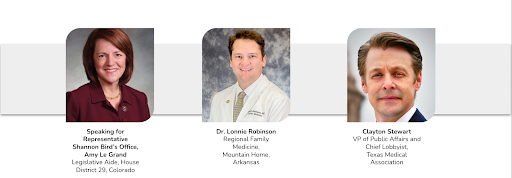
Aledade National Policy Collaborative
By Jennifer Lyons and Will London
Primary care physicians across the country are facing excessive administrative burden: detailed reporting, conflicting requirements across multiple payers and complicated billing procedures all contribute to a frustrated and spread-thin physician workforce.
Prior authorization compounds these burdens.
Prior authorization is a seemingly well-intended management process through which health plans ensure they provide coverage only for necessary patient services. But what does this mean for the practice? Often, the process of prior authorization for certain services results in providers spending hours processing these requests, which expends resources and limits valuable time with patients.
Aledade’s fourth National Policy Collaborative highlighted some of the challenges of prior authorization and explored policy solutions that seek to relieve its burden on providers. Aledade Chief Policy Officer Sean Cavanaugh moderated an active panelist discussion that illuminated the following themes.

Prior authorization impacts the patient-clinician relationship
Lonnie Robinson, M.D., a primary care physician at Regional Family Medicine in Mountain Home, Arkansas, detailed how prior authorization complicates interactions between practice staff and patients.
“[Prior authorization] feels like a speed bump slowing down the process for the patient. It puts a strain on the patient I’m seeing and the patient in the next room waiting to see me. It puts a strain on me as a provider and on my healthcare team. We need a different approach.”
Like many other primary care physicians, Dr. Robinson is an active participant in Aledade’s policy committees, which empower independent practice and community-based clinicians and staff to collectively advance legislation that benefits primary care. Aledade’s Arkansas policy committee was a leader in the successful advocacy effort behind HB 1271, which exempts certain providers from prior authorization requirements.
Centering the provider voice is essential to advocacy for prior authorization reform
In an effort to curb the unintended consequences of prior authorization, Colorado passed HB 24-1149 in 2024. Crucial to the advocacy effort behind the bill was the Health Can’t Wait Coalition, a group of patients, providers, and associations, including Aledade, that aims to end delays to healthcare access for patients.
The bill, which goes into effect in 2026, requires health plans to submit and process prior authorization requests electronically and extend the duration of an approved prior authorization from 180 days to a calendar year. Amy Le Grand, Legislative Aide to Representative Shannon Bird (District 29), explained the importance of the provider experience in shaping this successful legislation.
“This bill came from the physicians. The delays in care and how harmful that can be to patients was a central component of the legislation.”
In her discussion, Le Grand emphasized the importance of the relationship between the constituent, a clinician, who brought this issue to Rep. Bird’s attention. Without that initial outreach from a physician, this issue likely wouldn’t have been introduced to the legislature, let alone passed.
Creative policy mechanisms like gold carding are effective in enacting reform, but need a tight framework to ensure their success
Many states have introduced or enacted legislation in recent years to simplify prior authorization. To wit, nearly 90 prior authorization reform bills were introduced in 2024 across 30 states. Gold carding, a practice through which health plans waive prior authorization on services or prescriptions ordered by providers with a track record of approvals, is an increasingly popular mechanism for reform.
Through the Gold Card Act (HB 3459) of 2022, Texas was the first state to introduce gold carding legislation with the intent of limiting prior authorization burden. Clayton Stewart, Vice President of Public Affairs and Chief Lobbyist of the Texas Medical Association (TMA), shared the lessons that the TMA and its allies learned in their first-in-the-nation effort to enact gold card legislation. When drafting the legislation, stakeholders strove diligently to incorporate comprehensive language into the bill to ensure widespread compliance. However, in some cases there is room for different interpretations of the requirements. For example, some payers continue to require prior authorization for medications covered under the GCA when the dosage or amount of these medications changes. Growing pains triggered by innovative legislation are not uncommon, and Stewart highlighted other lessons for states to consider when approaching this.
“One of the things that will be essential to incorporate going forward is data collection and reporting, so we know that [the legislation] is functioning as intended.”
Thankfully, these challenges have not prevented other states from following Texas’ lead. Arkansas’ legislation, which Dr. Robinson helped to enact through Aledade’s policy committee, was modeled after the Gold Card Act, incorporating gold carding as a core component.
Looking ahead: driving ongoing, national momentum for prior authorization reform
Prior authorization is a burden to practice staff, providers and patients, but there is strong momentum behind reform at the state level. Aledade continues to work with stakeholders to elevate the collective voices of primary care clinicians across the country, driving policy solutions that create better systems for providers, patients and society. With this Collaborative, Aledade is poised to bring the national conversation around prior authorization to partner practices and stakeholders. We hope the Collaborative continues to drive transformations across the nation and re-sharpen focus on what’s most important: patient outcomes.
For more information on Aledade’s policy initiatives, please visit our Policy Page or reach out to policy@aledade.com.
